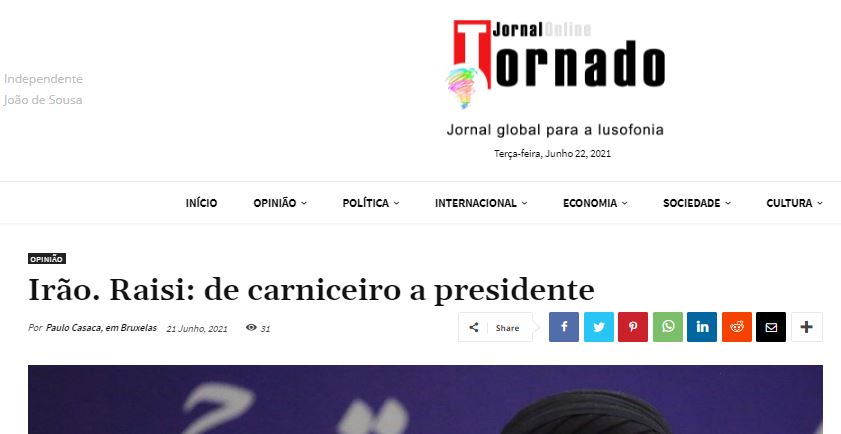By Paulo Casaca in Brussels21 June, 2021 – Jornal Tornado
The British Telegraph rightly headlines: ‘Iran’s new President should be in prison, not in power’, echoing the position of Amnesty International which reacted to news of Raisi’s ‘election’ with a call for an international investigation.
The 1988 Massacre
The 1988 massacre , in which the Iranian spiritual leader issued a fatwa to murder all unrepentant oppositionists in prisons, regardless of the regime’s judicial processes, will have claimed some 30,000 victims – including pregnant women, and with women women necessarily raped before the murder to ensure that they would not have ‘entry into heaven’ – it is apparently no different from many others we know in greater or lesser depth.
We remember, however, Hitler and the Holocaust, Stalin and the Holodomor, the Red Khmer, the Rwandan genocide and so many others… and we almost passed to conformism, another black page of humanity that is difficult to distinguish from so many others.
The vulgarization of the holocaust, the absurd way in which past and present are mixed, in addition to the biased readings of history, everything tends to blur reality and make us look less closely than necessary for this massacre, the most emblematic of the savagery of the theocratic regime.
There are reasons to look at this massacre particularly and closely. It is a crime against humanity of a regime that is in office and, no, it is not even a regime that has moderated or reformed – and the proof is in this election/appointment of the main protagonist of the massacre to the functions of President.
Afterwards, even the Nazi regime did everything to hide the evidence of the barbarism it committed, and the Iranian, if it is true that he buried the corpses in mass graves and that destroys any and all signs that might indicate their location, only does so because with he nor the victims’ bodies have rest. Iranian leaders – starting with the now-appointed President – not only do not deny the crime, they boast of having committed it.
The selection for President of an individual whose only thing on his resume is forty years of career as a revolutionary professional accusing, prosecuting, persecuting, torturing and murdering dissidents sends a clear message that the regime does not care about human values or his good name in the international community.
The presidential nomination
The Iranian regime is theocratic, meaning that power is in the hands of the clergy who arrogate to themselves the right to govern men in the name of God. The spiritual guide is the first figure of the State and is simultaneously the religious and political leader.
The regime allows, however, the interference of the people in the designation of the second figure of the State, the President. Here, the clergy selects a small number of candidates and allows the people to choose among them, yet in the past it was necessary to dress up to correct results that did not confirm the intentions.
This procedure fueled the fiction – carefully maintained by an appeasing West – of the existence of moderate and radical factions and the people’s ability to make their opinions felt here.
In the Soviet Union, candidates were also selected, in this case by the party and not the clergy, and voters, when confronted with a single candidate, could reject him, which they did several times, without anyone in the West. if he had remembered to grant democratic credentials to the process.
What happened differently in these elections was that the government waived the need to allow candidates who could be interpreted as having any disagreement with the supreme leader, joining the designated candidate to win half a dozen unknowns and eliminating from the list top figures of the state.
The process was so scandalous that it led to the biggest abstention ever, with the Iranians massively ignoring the electoral masquerade, thus further conditioning the legitimacy of the process.
prison instead of presidential palace
The British Telegraph rightly headlines: ‘Iran’s new President should be in prison, not in power’, echoing the position of Amnesty International which reacted to news of Raisi’s ‘election’ with a call for an international investigation.
Western appeasers who intend to bless the Iranian nuclear plan in a ridiculous resurrection of a nuclear deal that was bad in 2015 and which is a fantasy these days, if they persist in their attitude, if they think they can ignore the message coming from Tehran, they will be to betray what is most sacred in the international order, which is the right to life.
The Iranian boycott of last Friday’s electoral farce must now be followed by the West, which must demand an international criminal investigation into Raisi’s role in the 1988 mass murders as a condition of any dialogue with that country.
This is the way to ensure the indispensable solidarity with the Iranian people, but it is also the way to fight, nowadays, against all the power that asserts itself through the mass murder of its dissidents.
Paulo Casaca in BrusselsHe was a member of the European Parliament from 1999 to 2009, in the Portuguese Parliament in 1992-1993 and in the Regional Assembly of the Azores in 1990-1991. He was a visiting professor at ISEG 1995-1996, as well as at ISCAL. He is the author of some books on economics and international relations.
